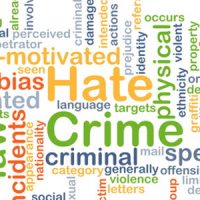Lawmakers Mull Expanded Hate Crimes Law

Because of an increase in anti-Muslim and anti-Semetic incidents, Dan Helmer (D-Fairfax) wants to extend hate crimes law coverage to include ethnicity.
Helmer’s bill would offer protection for Jewish people who may not identify with the religion, but whose heritage is connected to the culture. “My sons, like many other children, have faced antisemitism in school, and we must take substantive action to protect the Jewish community, as well as any individual targeted based on ethnicity, to secure everyone’s fundamental rights to self-expression and safety in our Commonwealth,” he said.
Nationwide, the Anti-Defamation League has said it’s recorded a significant spike in antisemitic incidents since the October Hamas attack on Israel. Furthermore, the Council on American-Islamic Relations — or CAIR — reports what it calls an “unprecedented” spike in complaints of anti-Muslim or anti-Arab bias.
The Hate Crimes Enhancement
If the defendant targeted the victim because of his/her actual or perceived membership in a protected class, the court can tack on an additional six months in jail to a misdemeanor. The six months includes a mandatory 30-day minimum. Any felony automatically becomes a Class 6 felony (one to five years in prison).
Note that targeting the alleged victim, not animus toward the alleged victim, triggers the enhancement. Prosecutors often exploit this loophole. Theft, which is normally a low-level misdemeanor, is a good example. Prosecutors can use the enhancement if a defendant shoplifted from a black-owned business for reasons unrelated to a dislike of black people.
Currently, the hate crimes enhancement in Virginia only applies to the following classifications of people:
- Religion,
- Race,
- Color,
- National origin,
- Pregnancy,
- Childbirth or related medical conditions,
- Age,
- Marital status,
- Sexual orientation,
- Gender identity,
- Military status, and
- Disability.
The penalty enhancement adds to the burden of proof. In addition to proving the underlying elements of the crime, prosecutors must establish targeting for a prohibited reason. And, they must establish this point beyond a reasonable doubt.
The enhancement is difficult to fight. Usually, a Leesburg criminal defense lawyer focuses on the underlying offense. The hate crimes enhancement doesn’t change the available defenses.
These defenses usually include procedural and substantive defenses. Procedural defenses focus on rights violations during the arrest and investigation process. Fourth Amendment search and seizure violations might be the most common procedural defense. Substantive defenses attack the credibility of the state’s evidence.
Civil Issues
Virginia is one of the few states that extends the hate crime enhancement to civil court. Under Section 8.01-42.1, an alleged victim may obtain a restraining order against a defendant if the defendant:
- Harassed or intimidated the alleged victim, or
- Committed a violent act, because of the alleged victim’s
- Race, religion, gender, sexual orientation, gender identity, disability, or ethnicity.
If the court grants an injunction, the victim is entitled to compensatory damages, punitive damages, and attorneys’ fees.
The burden of proof in a civil claim is only a preponderance of the evidence (more likely than not). That’s a much lower standard of proof that the one used in criminal court.
The possibility of civil liability makes it much more important for a Leesburg criminal defense lawyer to either get the criminal case thrown out of court or convince prosecutors to drop the enhancement add-on.
Work With a Savvy Loudoun County Lawyer
There’s a big difference between an arrest and a conviction in criminal law. For a free consultation with an experienced criminal defense attorney in Leesburg, contact Simms Showers, LLP, Attorneys at Law. We routinely handle matters throughout Northern Virginia.
Source:
lis.virginia.gov/cgi-bin/legp604.exe?241+sum+HB18
